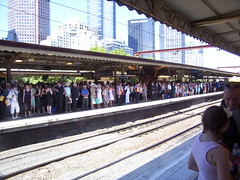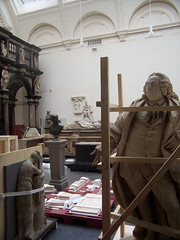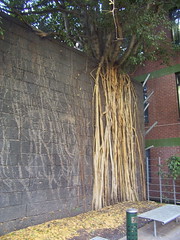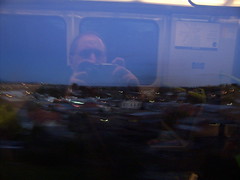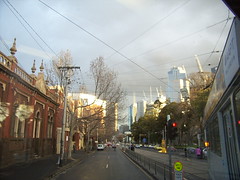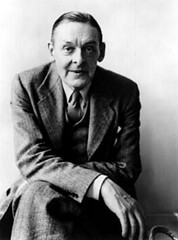Sunday, December 25, 2005
A year Old, But Whatthehell...
North Melbourne
Christmas Eve 2004
Robert Whalley
Merry Christmas! Merry Christmas! Merry Christmas! Have you heard that much this year? I think I heard it first a few weeks ago, but it was October when I first saw some red and green displays showing themselves at Big W: and then there was a small mountain of red and green coca-cola six packs and I knew it was on the way. Merry Christmas. It is usual, expected this time of year, like part of the family; the greeting, the day, the feast, happens every year, and we forget how very odd it all is, how strange. The surprising child so far away, the shepherds in the field, terrified to see that what they thought was far off, was coming closer, magnified in their eyes and ears. “For to us today is born is born a savior…” Even without the foreigners coming along with gifts in a few days, it is a very foreign story.
These days we generally don’t seek a savior, though most days we do the best we can with what’s out there, and that is important. We do what we can; cobbling together an identity from need and custom, mixing memory and desire to meet the marketplace, minimizing the pains that come. We take up the daily tasks, watch the news, get along. And usually avoid the fleeting feeling that we’ve missed the train for some important event along the way, not seen the sign or taken the turn, and the billboards along side seem diverting enough while we speed on our way.
But then, sometimes, someone or something comes along from the deeper realm of birth and death, and we remember that our views and vocabulary are made up, choices that we’ve agreed to most days; to be certain ways, to see certain things. And we remember that we see only what we look for, and maybe we haven’t looked far enough or close enough lately.
So, how can we learn to see farther, how can we come to see closer? I think this child, this baby Jesus, is a kind of lens enabling us to see farther and closer. The chance of this child makes us focus, clears our sight for a moment, to look out on a world that may be much bigger then we know, may be more full of intent and information than we’ve ever supposed. The birth of this child can sometime make us wonder if the universe is both much larger and more intimate than we’ve expected. It is a surprise.
Yet there have always been hints and guesses that this might be so. From both the new science and the old poetry, wisdom speaks across tradition and time, that love might have a human face, that justice may prevail and warring factions finally lay down their weapons and find peace, that the meek will be blessed, the lost will be found. And hearing all these ancient echoes across time, we do occasionally glance around, in these busy times, to see if a new revelation might be born.
Mary takes that chance – if we listen to the story: a teen-aged woman in first-century Palestine, with her assured future along the common way, hears an angel, messenger of heaven, very foreign, proclaim that newborn truth could come from somewhere else, and become flesh of her flesh, beyond belief, virgin-born life. And she says Yes to that inconceivable possibility: and gives her future, her ascent, her life towards that new life,
Can we take that chance? When the world is so crowded with noise and news and necessity, can we take the chance that a true new love can come to us here and now, that each of us, every one of us might serve as messengers, birth-givers, seed bearers, mothering some unknown merciful truth to be born in the middle of here and now? What if that light did dawn for us tonight? What if?
Listen: we are here to sing the songs, pray the prayers, remember the story, take the broken bread and wine of the savior into our own bodies and blood, and consider this: that the creator of the whole shebang has come here into the very middle of everything, as newborn, self-giving love, as interconnected relationship which is wanting to be known, lived into, lived out. The kingdom of heaven has come among us, close as seed and breath, light, sight, soul. What can we say in response, how do we live with this?
Can we will to stay with this story? It is not easy, will mean both death and birth for us. Paradoxically, it is both painful yet full of promise: to live with the contradiction of infinity and fragility, history and hope, Can we be present to the timeless one coming into the world just in time to meet our long list of demands with a simple story of love and acceptance, and an assurance that no one and nothing will be lost at the end. Is that possibility enough for us to begin to take up that task and that discipline now?
For tonight it is Christmas Eve, when we remember his birth. And some kind of window is open; the light comes through, a connection is being made. In the midst of a tradition where much is superfluous, archaic, irrelevant, dying; there is something alive, newborn, waiting to be lived, not only in Bethlehem but here and now, in you and me. Take the chance, it says, that the Creator of all has come closer, deeper into all creation, waiting to be known, to be present, as newborn love. Can we take this up? It will take time, discipline, thought and action. But if it happened once, can it happen here? Can that creative love take form and direction, heart and breath, flesh and blood again? Can we enter into mystery and faith in this noisy age and let this hope be born again so that a new and enduring love may live in our own lives, in our own world?
There is no program for this seeing; it is only given. But in this moment, and in the moments that follow in this holy season; may we keep our eyes open, our hearts clear, our wills ready, so that we may take up our part in bringing the reality of that child we remember today to the midst of the world he waits to serve.
Merry Christmas!
Friday, December 23, 2005
Getting ready...
So I look forward to the celebrations tomorrow night: first a Mexican dinner with the ministry team at St. Peter's Eastern Hill, then Carols and the Midnight Mass with all the smells and bells that can be mustered, and that's quite a lot at St. Peter's.
We did an Advent series for four Thursdays during the season and that was good preparation, but the best of Christmas often comes as a suprise, as Eliot writes in Choruses from the Rock, "The altar must be built in one place for the fire to descend in another" and I am ready for that fire to come and surpise me tomorrow night.
Have a blessed holiday!
Tuesday, December 20, 2005
RMIT UNIVERSITY IN THE PUB
"In the wake of Disney’s epic movie adaptation,
discover the spiritual, mythic and ethical
implications of “The Chronicles of Narnia”
as RMIT academic John Lenarcic engages
in conversation with university chaplain
Robert Whalley. "
Wednesday January 18th 2006 at 7pm.
Free admission
The Stork Hotel,
504 Elizabeth Street, Melbourne.
Phone: 9663 6237
www.storkhotel.com
Sunday, December 18, 2005
Fourth Sunday in Advent - St. Stephen's and St. Mary's, Mount Waverly
“It is the international system of currency that determines the totality of life on this planet! That is the natural order of things today! That is the atomic, subatomic and galactic structure of things today! Am I getting through to you, Mr. Beale?
“We no longer live in a world of nations and ideologies, Mr. Beale. The world is a college of corporations, inexorably determined by the immutable by-laws of business. The world is a business, Mr. Beale!
“It has been since man crawled out of the slime, and our children, Mr. Beale, will live to see that perfect world in which there is no war and famine, oppression and brutality— one vast and ecumenical holding company, for whom all men will work to serve a common profit, in which all men will hold a share of stock, all necessities provided, all anxieties tranquilized, all boredom amused. And I have chosen you to preach this evangel, Mr. Beale”.
And Howard Beale, played by Peter Finch in the 1976 Oscar winning film, “Network”, can only look and say, “I have seen God”, and Arthur Jenson, the television network chairman played by Ned Beatty, smiles and says, “You just may be right, Mr. Beale.”
But he just may be wrong too. For that may be one, very powerful way of envisioning the world, of making sense of what to do and how to be, what matters and what lasts: but there are other ways as well, and that’s why we’re here, to enlarge our hearts and minds, and to deepen our understanding of other, even truer, ways to be in the world; maybe just as one old prayer puts it , to “keep our pity fresh and our eyes heavenward, lest we grow hard”
So, here’s a second - and again somewhat edited – scene with a few similarities to the first.
Here a young girl is met by a messenger who says this:
“You have found favor with God and you will bear a son who will be the child of the Most High, who will reign… forever, and of his kingdom there will be no end. The Holy Spirit will come upon you, and the power of the Most High will overshadow you; therefore the child to be born will be holy; he will be called Son of God’… Then Mary said, ‘Here am I, the servant of the Lord; let it be with me according to your word.’ Then the angel departed from her.”
So my question is this: how do you see this, make sense of it, how do you connect this announcement of Good News with your own life? I like movies a lot, and I think one of the best films on the life of Jesus is a low budget 1960s movie called “The Gospel According to Saint Matthew”, directed by an Italian named Paolo Passolini and made on the island of Sicily. The way he films this scene is especially wonderful. Mary is a beautiful young girl, and when she sees the angel, a gorgeous creature, her eyes light up in amazement, love, rapture.
You can see absolute joy in her eyes to receive this message, to let it come into her life. And then we follow her through the film as she follows Jesus. We see her when they nail her son to the cross and take his body to the tomb, we see her two days later when she goes with the other women to anoint his body and finds instead an angel at the door to the tomb announcing that he now lives; and it is the same angel! You can see that old joy in her eyes, it is an old face now, wrinkled by the years, but the same eyes, and the joy when she sees the same angel.
So what angels do we see? What messengers do we make room for in our sometimes so crowded lives? Most of us don’t live in the movies or in scripture for that matter, though we may find them important for our envisioning: so we don’t often get androgynous Italian youths telling us that we are blessed, will bear fruit for the healing of nations.
Nor do we hear, as Mary will hear from Simeon, that a sword will pierce our heart as well. But we do get a lot of messages about who we are and what matters, what we can take for granted and what we can give to one another,
we hear these messages on the television and the movies and the radio as well. And sometimes they are very loud. They color our understanding of who we are and what we’re about. And they make it difficult, sometimes, to listen carefully when some surprisingly good news comes to us, as it did to Mary, and is almost too good for us to believe. But it is important be awake to come to take the chance.
For I believe that in the very centre of reality, in the deep heart of holiness, there is only one angel, only one message. It may come at different times, with a different emphasis, be heard in a different voice, using different words. But it is the same, and it is this: that God has come to dwell in the midst of humanity. As the angel’s message to Mary announces God’s intention to meet with her in unspeakable intimacy, to conceive a place where God’s love might dwell in the very centre of humanity; so God’s message comes, in all times and in all places, to tell us the same truth: that God is desirous of living with us.
God has come to build a home in our hearts, to make our human being a sacred place where steadfast holy friendship may be found, announced, created, made flesh, to make a meeting place where our - and every - life may be redeemed from unmeaning and insignificance.
For we, like Mary, are called to be a place, to live a life, which consents and opens to God breathing deep into all our individual being, our limits and loves, our history and hope, our talents and tragedies. For Mary it was to take a unique part in the birth of God with us, in giving human life to the one we call Lord and God, this Jesus whose birth we celebrate in this coming season of Christmas. That is one unique task, but it is a model for our call as well. For the messenger asks us, like her, to be willing participants, birth-givers in our own way and with our own God-given disabilities and abilities, taking our part in co-creating an unspeakably intimate and unbelievably great conspiracy of Holy love.
That is the heart of the message announced by the angel to Mary, and to us today as well. God is coming near, is here, here in the middle of your life. God is willing to meet you, is with you, from before your birth to after your death, and in all the intervals from here to there. God wants to keep company with all of us, all of the time. This is the greatest truth, the Good News that comes with Jesus and which, perhaps, has been forever, but angels, I think, always begin their message with the word “Now!”
Unfortunately we usually don’t. We say, “Someday”, or “I remember” or “What if” or “If only”. We so often hide from the promise and presence of God’s word meeting human flesh in glory. We hide in the shade of the tamer paler stories and slogans that are announced on every other street corner and on every channel: so many other announcements, messengers of wisdom, calling for allegiance and conformity: “Experts agree.” “You get what you pay for.” “Early to bed early to rise.” “Better not to try than to fail.” “Only take sensible risks.” “Play the percentages.” “The world is a business.” “Don’t get hurt again.”
And the Angel comes to us and says, “Now” in every moment and waits for our response in every instant. It is a response that requires amazing audacity and an even greater humility: and it is asked of each of us right now as it was asked of Mary so many years ago. Listen, Meister Eckhart said this in a sermon some 700 years ago.
“It is more worthy of God that He be born spiritually of every pure and virgin soul, than that He be born of Mary. Hereby we should understand that humanity is, so to speak, the Son of God born from all eternity. [For] When we humble ourself, God cannot restrain His mercy; He must come down and pour His grace into the humble, and He gives Himself most of all, and all at once, to the least of all. It is essential to God to give, for His essence is His goodness and His goodness is His love… God brings forth His Son in thee.”
And the voice of the angel is heard, and the word of the angel is now. And the gift of the angel, which we see in the promise of Mary, and know most fully in the life of Jesus her son, is that we, each and everyone of us, are blessed by God and welcomed into the joyous company those who offer life and live in Christ.
May it be to each of us according to his word.
Amen
Thursday, December 08, 2005
Thomas Merton writes...
Wednesday, December 07, 2005
Stained Glass
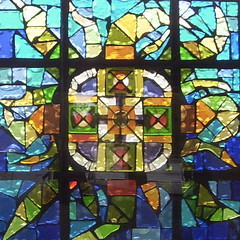
Stained Glass
Originally uploaded by Chaplinesque.
One of a set of panels at La Trobe Univeristy. I pass them several times a week, and they always refresh me.
Prayers at the Carol Service, RMIT University
And we shall say together, Shanti, Shalom, Salaam, Peace.
Let us take time to give thanks for the various traditions and communities, individuals and institutions, rites and rituals, human gatherings over time and place that open the sacred to us in daily life. To the constellations and communities that cast our eyes and our wills godward; encouraging and enabling us to find peace, live in hope and practice the faith and passion that comes in the centre of human beings fully alive.
And we shall say together, Shanti, Shalom, Salaam, Peace.
Let us take time in one silence to remember the world and its’ constituent nations and kingdoms, the powers and principalities of the earth: All the hegemonies of economics and desire, people, animals, plants, minerals, with all our shared histories of blood and hope, of sacrifice and sacrilege, victor and victim, corruption and redemption. That all our increasing knowledge may lead to a deeper and finer compassion and wisdom enabling us to take up the holy relationship of steward and lover, that we may care for all of ourselves, the family of all sentient beings, as well as all patient plants and minerals, as partners and co-creators within this fragile ecosphere.
And we shall say together, Shanti, Shalom, Salaam, Peace.
Let us take time in one silence, to give thanks and reaffirm our care for our own communities, the places where we live and move and have our being, where we work and where we live, where we laugh, cry, bed down and rise up daily. That we may be honest and open with each other, that justice and equity, fairness and honest affection may take precedent over economics and short term gains, that we may live and work together on the common path and not merely the bottom line.
And we shall say together, Shanti, Shalom, Salaam, Peace.
Let us remain in silence and recall those that have suffered in the past year, both in silence and in tumult, for all victims: for those who touched by wars and acts of violence, by fear, famine and natural disaster. For the people of Iraq, Israel and Palestine, the horn of Africa, Southeast Asia, and the underclass of the Americas and all other rich nations, that violence and terror, corruption and injustice might cease, and peaceful understanding grow; that we might see how much we have in common, how much we have to lose, and how much to gain in sharing peace and plenty.
And we shall say together, Shanti, Shalom, Salaam, Peace.
In one silence we remember that newborn and the departed, magical children and wise and wizened elders, those who have been close to us in our work or play, for all linked to us by blood or daily occupation, who are no longer near. In this transition time, we recall all who go on journeys, who go to unseen places and unknown ends; that there may be a connection that abides and, in some unforeseeable way, a union that returns. That we may one day be one again
And we shall say together, Shanti, Shalom, Salaam, Peace.
And in the midst of silence, we regard our neighbour, whether friend or stranger, nodding acquaintance, casual opponent or mystery of being, and we wish them well in this season of birth and beginning, of mystery and ending, as a gathered community of one silence and the gift of a variety of voices.
Let us say to one another, Shanti, Shalom, Salaam, Peace.
Wednesday, November 30, 2005
A Letter Sent Today...
I am forwarding along parts of a letter I received today from Sarah Wickam, current President of the La Trobe University Student Representative Council, asking that I help to gather some voices of protest and support for forthcoming action in Canberra on legislation impacting Student Unions at Australian Universities. Sarah has advised me that of the following:
"Earlier the reports out of Canberra and the coalition party room sounded like the VSU legislation would not get into the Senate before the end of the year, and that the legislation itself when passed would not be implimented until 2007.
"However, yesterday I received several phone calls from reliable sources including Jenny Macklin's education advisors that VSU is on the move, National Senator Joyce is as solid as he will ever be. In short, he is NOT voting for VSU. So this means that the Government needs one extra vote to get the legislation through. Their only option, the man they are looking at Steven Fielding, Family First.
"It seems that he has began to back down on his stance against VSU, although saying that he will support universities charging an amenities fee (Victorian style VSU) and that he will potentially move amendments to this affect. However he remain tight-lipped on what he will do if confronted with the full legislation or nothing. The Liberals are counting on him voting for the VSU legislation."
As a US citizen who is a permanent resident in Australia, I usually avoid commenting on national politics, but having finished my first year as a Chaplain at two Melbourne institutions, I am concerned that the prevailing mood favouring privatisation and fee for service may point to a future environment in tertiary education without adequate room or support for the unique culture of Universities. As I understand it, the proposed VSU legislation will severely restrict options for ancillary services and support that are crucial to a well informed and educated citizenry. My assumption is that the changes are designed to reduce left-wing political activism, but my fear is that it will be most hurtful and harmful in withdrawing necessary support services such as childcare, centrelink, clubs and societies and advocacy work etc. and will most negatively impact returning, mature age, and non-traditional students as well as those traditional students who have benefited from their association with student unions over the years.
I would not write to you if I did not see this as similar to a trend that has undercut Universities in the US for the last few decades, where the bottom line determines the value of the educational process. I would hate to see Australia follow the US lead in this sort of gutting of civil and social organizations. If you agree that this is a critical issue and one with deep moral, ethical and spiritual components that point to the importance of the whole community working together, I invite you to please write to Senator Fielding at the address noted below. The time is limited and your response may be crucial. Please consider writing as soon as possible.
As an American resident in Australia, I have found the idea of the "Fair Go" to be a noble foundation for a people seeking to live in community in a way that is both fair and good. It is one of the things I love and admire about this country. I fear that some of the forces behind the VSU campaign may be pushing against this in a way that could be extremely hurtful to the heart of this good land. I have seen where that road can lead in other places. I hope this land will not follow that path.
Faithfully,
Robert Whalley, Chaplain,
La Trobe University
RMIT University
Steven Fielding’s contact details:
Parliament Contact:
Tel: (02) 6277 3711?
Fax: (02) 6277 5713?
Email: senator.fielding@aph.gov.au ?
Address in Canberra:
Senator S. Fielding
Leader of the Family First Party
Parliament House
Canberra ACT 2600
Electorate Office:?
PO Box 500?Box Hill VIC 3128 ?
Ph: 03 9897 3307
Fax: 03 9897 4578?
Toll Free: 1300 736 017?(Toll free number is only available Victoria)
Sunday, November 27, 2005
The First Sunday of Advent - St.Peter's Eastern Hill
So, as part of my pre-Advent resolution, last week I started doing a series of stretching exercises on an almost daily basis. I follow a videotape that takes me through some yoga motions and progressive relaxation stuff. It’s not very heroic, no Jane Fonda routine, but it already seems to make a difference. For one thing, I am a little sore all the time, and also a little more aware of the grace and gift of my own body, this slightly over the hill and somewhat overweight God given miracle in which I live and move and have my being. So stretching almost every day comes to be a small way to say thank you for one of the amazing and complex gifts of life.
For Life is a complex mystery and I have come to accept that and even love it most of the time. When I was younger, I must admit, I just wanted someone to give me a simple instruction manual, preferably with lots of pictures! I’ve changed on that and I now wish that someone had taken me aside instead and told me some things like, “truth can be very big and very small, and it often has more than one side”. “You’ll find that some things are very important, some things are not important at all; and you won’t always know which is which until you reach the end.” “The one thing that we are absolutely sure of is that nothing is simple to understand!”
So Life is complex and paradoxical. And the reality of God, that ultimate truth, which we know and touch and celebrate here as the creative love, the day to day neighborliness, the sweet conspiracy of God is the biggest paradox of all. The reality of God is both completely simple and clear, and – at the same time - almost impossible to get your mind around. The Good news is that you might not ever be able to understand it, but you can take it into your heart and soul and you can live it out in every part of every bit of all your life. But it is complex, and maybe especially in Advent!
Here’s a story from Joan Chittister that came from our Thursday Night Advent Study series, which, by the way, I commend to you. She writes:
The Talmud teaches that every person should wear a jacket with two pockets. In the one pocket, the rabbis say, there should be a note that reads, "I am a worm and not completely human." And in the second pocket, the rabbis say, the note must read, "For me the universe was made."
That is very similar to what the modern Buddhist teacher Shunru Suzuki used to tell people, “You are perfect as you are, and you could improve a little too!”
But I will admit these simple and complex and paradoxical truths can be small comfort when evil and terror threaten to come round with force and surprise, and peace and hope seems far away. Then it makes sense that we want to be big enough to deal with big threats, that we would seek a mighty God to marshal the forces, battle with all those malignant powers and principalities we see on the nightly news. So, like Isaiah, we might cry: “O that you would tear open the heavens and come down, so that the mountains would quake at your presence.”
That just might happen at the end of time, the Scriptures hint at it, or at some equally cinematic vindication, but we don’t get surety. What we do get instead, and what we remember and celebrate, especially in the season of Advent, is a promise of a companion on the way, en-fleshed as a child. For the Good News that comes to live with us, in the very heart of who and where we are, is an ongoing relationship seen in the midst of a human life lived in love. A life that is a light from God, that can be very small, newborn, like a precious gift, but somehow this gift enlivens us to live more deeply and love more freely, right in the midst of being small and human and living and dying. And this means that we, as we are, in the midst of our smallness and our limits and our humanity have enough and are enough.
As Paul writes, “You are not lacking in any spiritual gift as you wait for the revealing of our Lord Jesus Christ. He will also strengthen you to the end... [For] God is faithful; by him you were called into the community of his Son, Jesus Christ our Lord.”
Again, some more Joan Chittister:
“When Advent seeps into our souls, we come to understand that small is not nothing and empty is not bereft. To be small is to need, to depend on the other. Smallness bonds us to the rest of the human race and frees us from the arrogant isolation that kills both the body and the soul. To be empty is to be available inside to attend to something other than the self. We become full of the blessings of life.
“Then, emptied out by the awareness of our own smallness, we may have the heart to identify with those whose emptiness, whose poverty of spirit and paucity of life is involuntary. Then, we may be able to become full human beings ourselves, full of compassion and full of consciousness.”
So that is the hope of our faith and the shape of our journey, our liturgy and our ministry as people of God, here and everywhere, in this community of St. Peter’s Eastern Hill as well as all the communities where we live and move and have our being. All the places where we stretch out and give thanks for this great complex package of life and death and for the deep love that creates, redeems, sustains us at every step along the way.
Here’s the last hypothetical lesson I wish I learned earlier: “Learn to be still and to move well, learn to stand tall and to bow often.”
There are a lot of us here who bow and light a candle as when we enter the Lady Chapel and this is a good thing. The Blessed Virgin is certainly a primary model for our ministry, both corporately and as individuals. To quote another part of the booklet for our Advent Study:
“God's 'Yes' in Christ takes a distinctive and demanding form as it is addressed to Mary. The profound mystery of "Christ in you, the hope of glory" has a unique meaning for her. It enables her to speak the 'Amen' in which, through the Spirit's overshadowing, God's 'Yes' of new creation is inaugurated. … Mary's 'Amen' to God's 'Yes' in Christ to her is thus both unique and a model for every disciple and for the life of the Church.”
For each of us takes a part in bringing the Word made flesh into our world through the work of our daily vocations. In that we become, in some sense, Theotokos, like Mary, God-bearers, bearers of God in human form. And here is where we all might learn to stretch a bit more in our ministries in this Advent.
In a moment we will gather at the altar for a blessing on the daily occupations where each of us as lay and ordained persons serve as ministers of Christ’s presence in this good world. I hope you will come up and share your ministry and that we may pray together for all the ministries that proceed from this place.
But I ask you one other thing, that before you leave the church this morning, you walk into the Lady Chapel and look at the statue of the virgin and child there, and resolve that you will look for the places where the love, the forgiveness, the healing presence of Christ waits to be born in the world. This can be a surprising exercise, it can stretch your understanding and your ability for ministry. For Christ is coming to be born in surprising places and to live and die and rise in simple and complex ways. And if you take time to see, then it may be that not less than everyone, friend and foe, neighbor and stranger, is a place where God’s grace and glory, hope and peace, is waiting to be born.
So take your place this season, as faithful witnesses and ministers of the place where God’s unquenchable spirit meets our human flesh. Like Elizabeth, Mary, Zachariah, Joseph, Simeon and Anna, take up the ministry of honoring this child who comes to join in our own humanity, this Emmanuel, God with us, to be born in the midst of us, and give thanks for this wonderful Advent.
Monday, November 07, 2005
A thought for a Monday
“The heavens are telling the glory of God; and the firmament proclaims his handiwork. Day to day pours forth speech, and night to night declares knowledge. There is no speech, nor are there words; their voice is not heard; yet their voice goes out through all the earth, and their words to the end of the world.”
And I thought: there’s the perfect refutation to the fundies, to the unbelievable arrogance that says words can encapsulate reality. I know a bit about poetry, and I know that good poetry points beyond itself to a truth that is beyond words. Good religion, spirituality, truth—telling, call it what you will, does th esame. It points beyond to something that is beyond belief, but something that can somehow be perceived subtly, dimly, by that open attitude some called faith.
in the 1920s a Mayor of New York City said that nobody was ruined by a book. I doubt that anyone was saved by one either. Words can be like that infamous Zen finger pointing to the moon, they can head us, open our hearts to reality. But the farther I go on the journey, the more I know that reality – and life and love and mystery and anything else worth looking at and risking for – is bigger than we can ever understand.
Sermon - The Feast of All Saints
6 November 2005
Preston, Victoria, AU
There are many stories in this great big world. Everybody has at least one. One story that I bring to you this morning is that I came here from California four years ago to work at a local parish, then last year to return to work in University chaplaincy at La Trobe University and, alongside Father James, at RMIT University. It is good to be here, to do work I love with people I care about, in a country that gives a fair go for its people, a country with a good heart.
But I must admit sometimes I miss the place I came from, I miss the sight of the ocean fog when it comes into San Francisco Bay through the Golden Gate at the end of the hot day. I miss the sounds of certain bird songs I know, even though the birds here are so bright and wonderful and so very noisy. And, even though I’ve made some great friends - people I care for, people who care for me - I do miss the faces of friends and family known all my life, people who knew me before I was born. I miss the land of my old memories, though in so many cases, memories are all that remain. Friends and family have, died and gone, moved on, and even if I were to return to what used to be home, it would not be to the place that lives in my heart and mind: for even if I am far away, they have gone farther. I will not see them soon, but I know that they are in the sight of God, and not far from this table. But sometimes it still makes me sad that the world is so big and so much is lost from my daily sight. Sometimes I wish my arms were big enough that I could reach out and hold all my family and friends, near and far away, close to my heart. But the world is so big and I am not that big. None of us are. But the feeling abides. We all feel like that sometimes. It is a part of our story as living human beings.
Here is a version of another, very old story that a man named Elie Wiesel tells.
Once upon a time, there was a great and holy teacher, and whenever trouble came to his people; he would go into a certain part of the forest to light a fire, and say one special prayer, and the people would be spared. Years later, when one his disciples saw misfortune coming he would go to the same place in the forest and say: "Master of the Universe, please listen! I do not know how to light the fire, but I am still able to say the prayer." And again a miracle would happen. And years after that, in another time of trouble, still another person of faith went into the forest and said: "I do not know how to light the fire, I do not remember the prayer, but I know the place and this must be enough." And it was. Then more time passed, perhaps up to the present day, and trouble came again, And this time it fell to one old woman, the wisest and most holy teacher in her town, to do something. Sitting in her chair, her head in her hands, she spoke to God: "I am unable to light the fire and I do not know the prayer; I cannot even find the place in the forest. All I can do is to tell the story, and this must be sufficient." And it was.
That story can be good news for us because we, all of us, live in a world where we feel that we no longer know the whole story: the world has gotten so big. Sometimes it feels like we have forgotten how to light the fire, say the inspired prayer, even find the place; and even though we might remember where the path was, sometimes it seems like the path might have moved.
That is why is why we are here today on this Feast of All Saint’s. To recall that no matter how big the world is, how wide the gathering of people over time and place, no matter how much seems lost, it is all found in the love God has for us, all of us, living and dead, lost and found. We are here to recall how God’s wide arms encircle us, hold us together in this and every place, church and village, town and country, past and present and future, here and now.
The stories we come to remember around this table on this Feast of All Saint’s are very old stories, told over thousands of year in many places and in many languages. Even though they are not always easy to hold on to, they are true. For they tell us that even though time and travel may take us far from what we used to know and where we used to be: the God of the universe is here and now. God is present in the life and love of Jesus Christ and the inspiration of the spirit, willing to bring us into the fullness of life, to the fullness of the present moment, to the fullness of the unknowable future.
So we look back into letter that St. John wrote almost 2000 years ago, to come to understand the life that Jesus shares with us, to live in his hope, and be enlightened by his life and insight. Remembering we are children of God. That God’s love is our family name, our most intimate home, both the place where we are planted and our hope for a future we cannot yet fully understand, for what we will be has not yet been revealed, but when he is revealed, we will be like him, and we will see him as he is.
And with that hope in our hearts we can look forward to that wonderful picture in the Revelation to John, that great poetic vision, where the ones who have come through great ordeals have washed their robes and made them white: all home now; no more hunger or thirst, no more blazing sun or scorching heat; for the shepherd guides them to springs of living water, where every tear wiped away, every scar washed clean.
And we look to Jesus, meeting us in the present moment at this table to assure us that whoever and wherever we are right now, we are found in his love. When we mourn, are poor in sprit, hunger and thirst for righteousness, practice mercy; work and pray for peace, meet persecution, pain, misunderstanding on the way – and we all do - then we are blessed, here, now and always; for that way – the way of peace, mercy, forgiveness, acceptance - is God’s way and God’s way will be our way home.
So, now we come to this table to give thanks for this true story, in the company of all the Saints and martyrs, known and unknown. We come together with the prophets and priests, the angels and archangels, the living and dead, the whole company of heaven: to join in praise, to lift our hearts and hope, to eat the bread of heaven and drink the cup of salvation. And to know in God’s good glory nothing and no one will be lost, and in God’s love and forgiveness all creation will be found, and finally be brought home.
Wednesday, November 02, 2005
Too Busy and Too Hot!
Life is very busy lately and I've been all over the map. End of the academic year stuff, lots of letter writing and reporting, and some crucial fundraising, meeting with students and staff with semester finishing tensions, a quick trip to Adelaide for a special birthday party, plus preaching a sermon at a wonderful wedding: life is full on!
Yesterday was Melbourne Cup Day and I went to the Flinders Street Train Station to look at people dressed for a day of horse-racing and partying. Australia does know how to party! Found an air-conditioned theatre and saw the newest version of Pride and Prejudice, came home and napped for a long time. It was a good underdone day.
But I've lost the discipline of writing regularly on the blog, And I repent! So I will try to try again, as soon as the pressure lets up!
Saturday, October 29, 2005
A wedding sermon for Sue and Mark
For in spite of all the predictions on the future of marriage, any marriage; Mark and Sue are here to be wed together in the face of God and this company, and we’re all very happy about that. Today, we’re all watching you and remembering how good and deep and wonderful love can be. Because you’re taking it with the most serious and realistic expectation there is! To tie a knot to live and die together, to deepen your day to day experience of life with one another as sign and sacrament and mystery; in sickness and health, riches and poverty, life and death: All the good and bad of it. You will be living in the very midst of that cauldron that Jesus tells us about in that font of expectations called the Beatitudes, which we just heard in the reading from the Gospels. You will share all this: You will be poor in spirit, meek and mourning, hungry and thirsty, needy and deeply human; and blessed, happy, loved, stewarded, inspired by God in an ongoing mutual ministry that will be your daily bed and bread and from which your ministry to the world, every day in every way, will be founded and formed.
It won’t be easy all the time, and you both know that already! There will be moments when your spouse starts to tell that certain story one more time, when the partner gets a certain look, utters a certain phrase, wakes in a particular mood, falls into a peculiar trait, and you think, “there they go again!” You don’t always have to like it, but you must always do your best to love them then and there!
Love is, as they say, a many splendored thing, but love will break your heart, exceed your expectations, expand your world, slay and resurrect your ideas of what life and commitment and community and God are all about; and that’s just on a slow week! But the deeper truth is that this partnership in expectation and demand will fill your world with the most precious kind of flesh and blood holiness. That is why we say that marriage is a sacrament and that is why we are here.
Here’s a quote I like a lot from an odd and wonderful film called Waking Life. It is talking about cinema or film here, but please substitute the word sacrament when you hear those words.
“Cinema…is about an introduction to reality… what the ontology of film has to do with is also what photography has to do with, except it has this dimension of time to it, and this greater realism to it. So it's about…[these people], at this moment, in this space… So what film is actually capturing is like God incarnate, creating. And this very moment, God is manifesting as this. And what the film would capture if it was filming us right now would be like God as this table, and God as you, and God as me, and God looking the way we look right now, and saying and thinking what we're thinking right now, because we are all God manifest in that sense. So film is actually like a record of God, or the face of God, or the ever changing face of God.”
Right now we are taking time, a moment, to participate in God creating, incarnating, inspiring, in the lives of Sue and Mark, in their love, and in our lives too, as people who love them. And I want to try something to mark this scene, something slightly different, something, I warn you, which may be seen as excessively Californian by some of you. But this is a way to let Mark and Sue take in a quick picture of the rich holiness gathered here at this very moment which - as all the spiritual traditions tell us – should not be looked at directly, is better approached obliquely. So, bear with me.
In a moment I will count to three, there will be a short pause, and then I will count to three again. When I count to three the first time, If your name begins with a letter from A to L, please look intently at the top of the first window to your right, next to the lectern. If your first name begins with a letter from M to Z then focus your gaze on highest point of this window to my right. To make it a little more interesting, if you are left-handed just stare straight up at the wooden cross at the apex of the roof above us. If you are in the altar party you are to simply look down at your shoes with great and deep devotion: if you want to do more you may put your right hand next to your heart. I myself will turn to the right and seem to be fixated by the icon of the second angel on the left-hand corner of the altar in the Lady chapel. Please be looking at your assigned spot by the count of three. On no account should you look forward, or at this couple, except in a very covert and fleeting glance: because some things are too awesome to be stared at directly. Is that clear?
Now, Sue and Mark, please stand. You are being looked at a lot today, and you better get used to that, because your promise to each other in God’s sight is a sign for us as well, a promise and a hope that we can live life more deeply, risk more, care more, belong more, to each other, to the world, to God. And we are here to celebrate that, as well as to pray for you, support you, love you, always, and especially here and now when you are serving as a sacrament before us.
So after I count to three the first time you can turn around and look at all these people, clouds of witnesses, icons of deeply holy persons, in a moment when nobody’s looking back at you and everyone is aware of how much particular, deeply caring and intimately involved love is in this room and in this world.
When I count to three again you can turn once more and be seated again. …
Are we ready?
1, 2, 3.
1, 2, 3.
In the name of Christ. Amen.
Monday, October 10, 2005
A Cat In Assisi
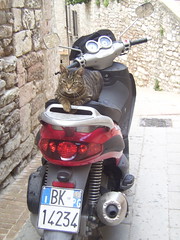
A Cat In Assisi
Originally uploaded by Chaplinesque.
A little late for St Francis' Day, but when I saw this I had to take the pic.
Monday morning
Last week I returned from a wonderful week-long conference in Sydney and then came down with a bad case of the flu. So now I am back on campus and trying to get balanced for the last few weeks of the semester.
Except for the beginning of the flu, the conference was wonderful. Some good presentations, a lot of useful ideas and networking, provocative conversations, and lots of laughter.
Chaplains are an interesting group. I think that each of us comes to the ministry with certain gifts and scars, and are not too sure which is which. We are usually found on the edge of the institution, and carry a critical attitude about some of the cultural accretions found within our various faith communities. But we are also people who seem to have room in their lives and work to value mystery as the primary thing: to keep an open heart to the amazing fact that people exist, live, breathe, make love, find work, write papers, survive mistakes, start again, simply renew. We are people who seem to have an ongoing and open-eyed appreciation of the mystery of being human, and see that as the main gift from God. We might disagree about how the God who gives the gift might be seen, understood, explained, responded to; but the fact that we are - each and every one of us - some kind of holy mystery that needs to be witnessed, honoured, encouraged, endured; that's the most important thing.
The best chaplains are probably better at making love than making sense; and I think that's all for the good.
It is good to be back at work.
Wednesday, October 05, 2005
Getting Over A Cold
I am probably getting better. I don't sneeze as much, my nose isn't running, the cough is drier, my ears are stilled plugged up, but while inconvenient, that is not a major complaint. I guess I will live, but dammit I hate being half-sick.
The conference was very good. 50 chaplains in one room makes for an interesting mix. I enjoyed myself, got some good ideas from others, and came away with some different ways of making sense on campus. Sydney was wonderful as well. The weather was great and I even got a bit of a sunburn from walking across the Domain after seeing the Margaret Preston exhibit at the Art Gallery of New South Wales, and, of course, this cold.
I am putting in a minimal day at RMIT, showing up and that's about it. Let's hope I feel better by tomorrow.
Sunday, September 25, 2005
Sydney Harbour

Sydney Harbour
Originally uploaded by Chaplinesque.
Where I will be for the TCMA conference during the coming week!
Sermon, St. Bartholomew's Burnley
I find this a chilling story because there is something in me that often wants to hold on, to an old idea, to an old idol, to an old pain, even at the cost of losing the gift of the present moment. But what is more important than saying yes to life, saying yes to God? Why would I say yes, and then turn away? Like the son who was asked to work in the vineyard in the lesson we just heard, why would I first say yes then say no, when I am asked to work for the harvest, when I am asked to join in the feast?
What keeps any of us from joining in, from fully saying yes and following through with the chance of this amazing celebration? What are we trying to hold onto? Is it an old idea of failure or success? Is it a worn out list of people we tried to impress when we were younger? Is it an old idea of our religion, of how to act it out and live it out? What are we holding on to that holds us back, that can trap us, trip us up, keep us from turning around to say yes to the present reality of God when that is what matters most?
A Buddhist teacher named Shunru Suzuki writes about “Beginner’s Mind,” which is the chance to do something like you’ve never done it before, to wake up what is new, right in front of you, like you’ve never seen it before. It sounds easy, but it often is not. Still it is crucial to wake up to the choice that is in front of you.
The funny thing is that it’s often those of us who’ve been around religion, around the church for a while, who can most easily fall asleep. We’ve prayed the prayers, read the lessons, taken the class, bought the t-shirt. We’ve shown up Sunday after Sunday and gotten the shape of it into our bones. But after awhile it gets old, dry, formulaic, like something we can bank on. And that’s when what we believe turns from something we live, that lives in us, turns from a living faith to a dead certainty. That is when yes can turn to no.
This shows up pretty regularly in my own faith journey, for there is always a part of me that wants to say, Can’t I take it easy for a while? Don’t I get something from all that work? With all this effort, where in God’s name is my equity? Was all this work for nothing?
And I do know better: know that the practice is good, time well spent. I am convinced, most days, that nothing is lost: that all the work, the effort, the prayers, the bible study, books read and plans made, the parish work-days, vestry sessions, choir rehearsals, meetings met. That showing up for those times can bring us more deeply into the present moment. But we need to let go of who we think we are and what we think we’re about, what we’ve accrued! We need to come to the moment and go to the altar with empty hands and no expectations, so that we can be open to grasp – if only for an instant - how big God’s love and grace can be, how far it will go, how close it will come. We come here – time after time – simply to begin again!
Go back to two other men in another Gospel story. Like the workers in the vineyard they were brothers of the same father. One, who is the prodigal, finally comes back to his senses in a very foreign country, finds himself willing to return, repent, turn around and go home to find charity. The other, older brother, so careful, so right at doing the right thing, stands at the door of the house where the celebration for the returning wastrel is just starting, saying, “What about my equity, what I did right, when I showed up? What’s it worth? What does it matter?
Can you see his hand, his life, caught in the trap of trying to get what he wanted, what seemed to be bought and paid for already, while all the while so much love, forgiveness, renewal, is waiting to be known, received, celebrated? Can you hear the father calling?
Just come into the rich opportunity of the present moment. Don‘t save your life just to lose it, while love is opening the door wide to everyone. When forgiveness opens the door, when the father comes to call you to the party, don’t let your standards, your judgement, your idea of what is right and wrong, good or bad, keep you from joining in this great celebration.
One more story. When I was in seminary in the 1980s there were a couple of TV shows iabout what would follow were a nuclear holocaust to happen: I still remember the pictures of the light and the wind and the fire that would follow the dropping of the big bombs. I was living in Berkeley then, and whenever I would hear the bells in the campus tower striking the hour I would stop what I was doing and look at the possibility that it all might end. Looking around while the bells were ringing in the cool spring morning air and the soft light and think: "It could all be over, vanished, finished." And when the bells stopped ringing and the sounds of everyday came back I would look around and think; "There is a chance, we are not dead yet."
We need to wake up, wake into the grace, the deep hope and opportunity of the present moment, because we are not dead yet. And there is a chance that [in a not quite-easily-understandable way] that we are somehow, by grace, newborn, like children, full of possibilities, full of innocence and promise, full of beginning. So it is time, with empty hands and open hearts, to join with everyone, known and unknown, worthy and unworthy in the great party, the final feast, taking part in, celebrating the harvest, because we are there even now, coming home and waking up to take up this amazing gift of life.
In the name of Christ.
Saturday, September 17, 2005
Friday, September 16, 2005
New Orleans - some late thoughts
But, last Sunday when I was fielding questions about the chaplaincy at a local church, one guy asked about the similarities of the Old Testament lesson for the day – the Israelites getting across the dry bed of the Red Sea while Pharaohs army are mired in the mud to drown – and the situation in Louisiana. I had thought about it, had read the lesson already, ruefully considered the incongruity of the images jouncing together; but it hit me then, as I tried to put words to it, that while I had always seen myself with the Israelites, getting past the army, making towards the wilderness of new community and possibility, that is not my place.
As an American – 10th generation, Mayflower descendant, I carry all the credentials – I now belong to Pharaohs tribe. It is my own people who have sent the troops to protect the mighty and damn the poor and fragile – who forget the meek, those who hunger and thirst. The pictures coming from the American south, as well as those that come from Iraq, show me that there is an evil at work in the country I love. And it breaks my heart.
Four years ago, I went to a service at the local Cathedral for the events of 9/11. I kept my countenance until we sang, “Thine alabaster cities gleam, undimmed by human tears,” and then I lost it. But this is worse. The words that come to me now were chiselled on the base of the Statue of Liberty across the harbor from the building site where the WTC used to stand. They read:
Give me your tired, your poor
Your huddled masses yearning to breathe free
The wretched refuse of your teaming shore,
I lift my lamp beside the golden shore.
I have seen the huddled masses, the teaming shore, and I am deeply ashamed of my country. I pray that God may have mercy on us.
Wednesday, September 14, 2005
"What Does A Man Mean?" Join the group!
I am wondering about a men’s film series here. Maybe Fight Club, Brother, Where Art Thou? The Blues Brothers, plus a few others, as a way to get some men into the support group that Julian Mc Nally, a guy from counselling, and I are facilitating together.
The facts are that men have more problems with suicide, depression, loneliness, suicide, substance abuse, then women do. And, I think, part of that is simply because we don’t talk about it. I was in my late twenties before I found some friends who I could trust enough to share deeply about my own constellations of concerns about family, work, worth, relationships, to say nothing of sex, drugs and rock and roll,
Tennessee Williams writes somewhere, “In a world so full of lonely people, it would be an unforgivable sin to be lonely by yourself.” If you are a man studying at RMIT and want to be part of a good men's group, come by the office (under Sacred Space) Wednesdays at 4:00PM. As we say on the flier, "You are welcome to come and listen, talk and share as you like, meet others and leave when you want, all is less than an hour, guaranteed!"
Wednesday at RMIT
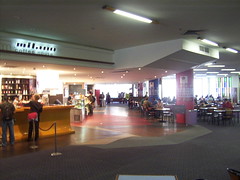
Wednesday at RMIT
Originally uploaded by Chaplinesque.
At this very moment, I am sitting at the table to the right in this picture, but I wasn't there when I took the picture, and I may not be there when you read this.
Tuesday, September 13, 2005
La Trobe on a good spring day
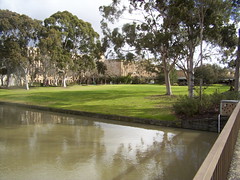
La Trobe on a good spring day
Originally uploaded by Chaplinesque.
I will walk across this bridge in a few hours, but it won't be the same - it is never the same!
From a sermon, St. Peter's, Bundoora
Friday, September 02, 2005
Waking Thoughts
But life is pretty good. I am enjoying work, moving to a new point in getting to know staff on both campuses and being methodical about it, acting like an Enneagram 3 in good ways. I am working hard, which takes me to another way of being in the world. I am speedier, more impatient, more direct in some ways, and that brings in the whole issue of pacing; which brings me to waking up too early in the morning.
I awoke before 4:00 this morning, listened to a radio interview with the woman whose life the TV program “Medium” is based upon – which ended up relating to someone I am seeing at work – and then really didn’t feel sleepy. I have a 7 AM breakfast meeting nearby, so it will be an early day anyway.
How do I prepare for my work? Listening to this medium, who is very clear about her gifts, abilities and priorities, I wonder how obedient to my calling, my unique soul work – however it’s put – I am, how obedient I could be? There’s a woman in the parish who’s very focussed on the Virgin Mary. The other day I wondered to her if there were alarm clocks that rang the Angelus. She said she has icons of the virgin by her bed and always looks at them and prays when she wakes up. it’s not my style, but that’s not a bad way to wake up. How do I prepare for my day? Where do I remember who I am?
I’ve been doing a noon meditation time (“Opening Silence, Recovering Freedom”)at both places where I work, Wednesday at RMITat Sacred Space, and Thursday at La Trobe in my office, and yesterday, when no one showed up, I went back to computer work. Then a young woman showed up at 12:15 and we did do 20 minutes of silence, and it was good for the rest of the day. I find when I meditate I am more grounded, have more sense of flow, get some very interesting ideas – which I am tempted to write down right then! – and finally get a sense of obedience and grace, that I am really here in the service of something else, bigger and better than I can easily understand or speak of.
I get much of the same thing when I do the services of stretches and exercises that Michael Murphy and George Leonard put together in “The Life We Are Given,” a very good book. It ends with some yoga asanas that leave me feeling thankful and right-sized; like I have done and will do good work: an obedient servant.
So I sit here with first cup of coffee to my left, writing on my laptop with Janis Ian on the iTunes , and certainly that is devotional work for me, even links me up with the larger community, church or sangha as you like; but does it keep me balanced, give me foundation, make me remember what I am about and what I serve?
The tentative answer is a qualified yes, but still....
Wednesday, August 31, 2005
From Google
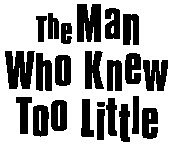
From Google
Originally uploaded by Chaplinesque.
OK, I did a search on my name, and this came up under images, need I say more?
Tuesday, August 30, 2005
Holy Sonnet
As yet but knock, breathe, shine, and seek to mend;
That I may rise, and stand, o'erthrow me, and bend
Your force, to break, blow, burn and make me new.
I, like an usurped town, to another due,
Labour to admit you, but Oh, to no end,
Reason your viceroy in me, me should defend,
But is captiv'd, and proves weak or untrue,
Yet dearly I love you, and would be lov'd fain,
But am betroth'd unto your enemy,
Divorce me, untie, or break that knot again,
Take me to you, imprison me, for I
Except you enthrall me, never shall be free,
Nor ever chaste, except you ravish me.
John Donne (1572 - 1631).
Sunday, August 28, 2005
Life, Death, Resurrection, Return - a sermon
So there’s a lot of good learning going on at St. Peter's: several series of Bible Studies on Thursday nights and Sunday afternoons, as well as the monthly meetings of the Canterbury Readers, who discuss essays by Rowan Williams. Good learning, good work. Looking deeply into these texts can sometimes be difficult, but it is worth the struggle, because when you really wrestle with the words, you find them pointing to a reality that is more than just words, more vibrant, something that pushes back; like human flesh, like God meeting human flesh.
So it is worth it: to study scripture, to work through theology, to meet in a church and talk together about what matters in the end. It is important to make room for raw questions and concerns to be heard and shared: the heart of God has room for that.
Our Anglican tradition makes room too, with a model for learning and discernment that uses the image of a four-legged stool - with one leg each in scripture, tradition, reason and experience. It’s a way we keep our faith spacious, balanced and honest.
First, we are people of the Scripture, and our daily lives need to be seen and understood in the history, poetry, genealogy, prophesy, revelation we see in the Hebrew Scripture, which we call the Old Testament, as well as in the Christian Gospels, Acts, Epistles and Revelation that we know as the New Testament. That is foundational.
We are also a people who have gathered, prayed, considered, and reflected in the light of those books for the last two thousand years. So there is an immense body of work, more writings, poetics, prophesy and politics, that need be considered: the work of the community gathered prayerfully throughout history, a deep and profound tradition that resounds and responds to the mighty acts of God over time, to the present day. So, Scripture and Tradition.
Then, we are a people who believe as well that the Spirit of God never ceases working in the whole world. In that light we use our reason to evaluate all good thoughts and actions, from all peoples and places and cultures, through education, the social and natural sciences, all technology, art and media, as ground for inspiration, redemption, recreation. We are not afraid to use our God-given reason.
And, finally, in light of the incarnation of God in Christ; we honour our very own lives, our corporate and personal experience. Here we take the chance that each and every one of us here, and everywhere, is a word of God, a gift of God: a place where God’s creativity, redeeming love, intimate conspiracy can come to new birth and speak in a new way. So Scripture, Tradition, Reason, Experience: The four components in this Anglican way.
The Gospel for this morning has four parts as well. Remember, what we just heard comes right after Simon-Peter’s confession of faith, right after that great moment when Peter had identified Jesus as God’s anointed one, the saviour, and Jesus had called him Petros, the Rock. So now we have the unfolding of another level of who the saviour is and how that saving life lives out in history. So, Jesus “began to show his disciples that he must go to Jerusalem and undergo great suffering at the hands of the elders and chief priests and scribes, and be killed, and on the third day be raised.”
Poor St. Peter! Think what it must have been for him, just after he is called the Rock, after all that clarity, that light and glory, after he got it right! To start to look ahead at the dark and dirty death of all this love, all he had staked his life upon. You can see why he speaks up, as Peter so often does, “Wait! Now that we know what is right, what is good; it can’t go this wrong, this bad!” Everything in him rails against this new road.
But Jesus rebukes him: “You are a stumbling block to me; for you are setting your mind not on divine things but on human things…[For]If any want to become my followers, let them deny themselves and take up their cross and follow me. For those who want to save their life will lose it, and those who lose their life for my sake will find it…For the Son of Man is to come with his angels in the glory of his Father, and then he will repay everyone for what has been done.”
So, four more things to deal with; four very big things: life, death, resurrection and return. Poor Peter, poor us! How can we live with life writ this large, life asking this much? How do we follow the way of Jesus into these depths? How do we take this in and live this out? How can you get there from here?
Here’s a story. This last Friday I had lunch with two friends, and we were talking about what brings people to St. Peter’s. I said I thought in the end it is vocation, responding to an individual call that come in each of their lives, a call that bids come live life within the Christian story, and maybe that is where we go from here,
For each one of us here has had a moment, and maybe more than one, where God opens our eyes to glory, care, compassion; to the fragile beauty of what it means to be on this tenuous human journey together. Maybe that’s what some mean by being born again, for I think that is when our individual participation in Christmas comes: when Jesus – God’s word and work of love and acceptance and hope - is born in our lives. And that reality grows up and moves out into our world, begins to enlightens us and lighten up the world we live in, just like the Epiphany, where people come ‘round, see the difference, note the newness and the change.
But, for a lot of us, most of us, almost everyone, it often doesn’t last that long. Real life has a way of turning things around. The road gets narrow, the shadows of sin, accumulations of shortcuts and easy ways, our own and others, throw us into a desert of questions and conundrums where we walk the way of faith more slowly. It is the arid land of Lent, We’ve all been there, we know the story of the times that can take us where we might seem to lose the way; where we might feel lost. And here the man on the cross is a silent and eloquent picture for each of us, a picture of each of us in the place where hope falls silent and where we lose our lives, where all we know of faith falls dead.
But by grace a glory can come here, because the reality of the life and love of God rises up above all false accommodations, all less than adequate ways of seeing how big life is, for God’s life even has room for death. By grace we wake up to Easter! When our faith opens by grace to a new world, where there is a hope that is bigger than we know; and this hope often takes us to an understanding of - not only how big God is - but how intimate, how close God can come. Where we can arrive at a place where the whole creation seems to be speaking out in every language, in all deeds and words ands ways, even in a fertile silence, nothing less than the mighty acts of God. We come to a kind of Pentecost where the deep intimacy of the Holy Spirit enlivens our lives and reforms our relations and our understandings. It may not always last, it usually doesn’t. But you will remember.
Christmas, Good Friday, Easter, Pentecost! Life, Death, Resurrection, Return! We come here every Sunday with all the contradictions that come in living life on life’s terms, showing up and trying to be whole and human and holy, and Sunday after Sunday we stand in the middle of our lives, in the middle of this place, and say, Christ has died, Christ is Risen, Christ will come again! Life, death, resurrection, return!
12 years ago, when I was the chaplain at San Francisco State University, a really narrow, terribly unpleasant Christian pastor looked at me and asked, “Have you been born again?” And I said, "On a good day, at least four times!" The way God we follow is both that big and that intimate. As Thomas Merton puts it, we are called "to be repeatedly born in the spirit, in light, in knowledge, in unknowing, in faith, in awareness, in gratitude, in poverty, in presence, and in praise." Moving every instant: into a continuing and deeper participation in God’s creativity, God’s pilgrimage in flesh and history, God’s loving and continuing intercourse in the intimacy of the spirit. It is a wide way, a deep way, a wonderful way, a way that will grow you up and bring you home. So we come here to learn what it means to be alive, dying and rising in a world where Christ has died, Christ is risen, and Christ will come again. We come here to learn who we are.
Wednesday, August 24, 2005
For Anyone Besmitten by Cats
For he is the servant of the Living God, duly and daily serving him. …
For having considered God and himself he will consider his neighbor.
For if he meets another cat he will kiss her in kindness.
For when he takes his prey he plays with it to give it a chance.
For one mouse in seven escapes by his dallying.
For when his day’s work is done his business more properly begins.
For he keeps the Lord’s watch in the night against the adversary.
For he counteracts the powers of darkness by his electrical skin and glaring eyes.
For he counteracts the Devil, who is death, by brisking about the life.
For in his morning orisons he loves the sun and the sun loves him.
For he is of the tribe of Tiger.
For the Cherub Cat is a term of the Angel Tiger.
For he has the subtlety and hissing of a serpent, which in goodness he suppresses.
For he will not do destruction if he is well-fed, neither will he spit without provocation.
For he purrs in thankfulness when God tells him he’s a good Cat.
Christopher Smart
St. Peter's Eastern Hill, Melbourne
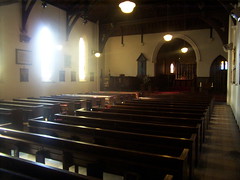
St. Peter's Eastern Hill, Melbourne
Originally uploaded by Chaplinesque.
Early in the morning it is very quiet.
Talking Religion, Spirituality and all that...
The Vicar and I were talking afterwards about how energysing it was to deal with that level of questioning and discussion. I think that "Christian Education" can degenerate into some pretty cloying sessions where everyone agrees that, "Jesus really is great, isn't he," and we go on to have tea. But there is so much that is absurd, beyond belief, needs to be taken out and shaken, pulled apart and looked through, probably with something stronger than tea on hand.
We are doing a lot of that at St. Peter's and, as I learn more about the two Universities where I am working, I will put more out there. One program we started at this parish has been the Canterbury Readers, where up to 12 people get together monthly for an evening to discuss a recent essay by Rowan Williams. He's sometimes a difficult writer, but worth the struggle, because when you really wrestle with what he's putting into words, you find it pointing to a reality that is (surprise) more than words, more vibrant, something that pushes back; like human flesh and God.
And it is worth it. There is reality, deep and good, under all the stained glass visions and ecclesial voices. And it is important to make room for raw questions and concerns to be heard and shared. The reality of God has room for that.
Thanks to all the people that showed up from RMIT on Monday, you gave me a great day!
Sunday, August 21, 2005
Santa Sophia Meditation Centre
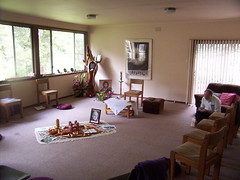
Santa Sophia Meditation Centre
Originally uploaded by Chaplinesque.
Where I led a weekend retreat on Thomas Merton which went very well. Cool rainy weather, giant green tree ferns, good food, silence and talk. God, I love my work!
Wednesday, August 17, 2005
Monday, August 15, 2005
A Sufi Poem
Now is the time to know
That all you do is sacred.
Now, why not consider a lasting truce with yourself and God.
Now is the time to understand
That all your ideas of right and wrong
Were just child's training wheels
To be laid aside
When you finally live with truth and love.
My dear, please tell me
Why do you still
Throw sticks at your heart
And God?
What is it in that sweet voice inside
That incites you to fear?
Now is the time for the world to know
That every thought and action is sacred
This is the time
For you to deeply compute the impossibility
That there is anything
But Grace
Now is the season to know
That everything you do is sacred.
-Hafiz
Saturday, August 13, 2005
Bill Viola...
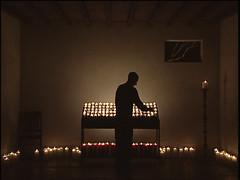
Bill Viola
Originally uploaded by Chaplinesque.
is a video artist, a visionary and a prophet. I saw a show of his at SF MOMA years ago and still recall it. An exhibition of his stuff open at the National Gallery in Canberra soon. It's worth the trip.
In The Name of Shameless Self-Promotion...
“Karith”
Dammans Road
Warburton 3799
03-5966-2120
“A Centre In Which All Things Converge”
a weekend retreat for meditation, discussion, reflection, silence and renewal.
August 19 – 21, 2005
As a fully formed religious in mid-life, Thomas Merton found renewal in the way he saw and related to the world. From his narrow beginnings, the centre of sanctity was now seen in the daily interactions of human beings within their whole lives. From this new standing place, Merton drew refreshing conclusions for a holistic spirituality that continues to enrich people. This weekend will enable us to reflect on our own journey in the light and life of the life and message of Thomas Merton who was one of the great spiritual writers of the 20th century and an early pioneer of inter-religious dialogue Come prepared to pray, learn, journal relax and laugh together.
Facilitated by Robert Whalley,
Chaplain, La Trobe University, Bundoora, RMIT University, Melbourne
Director of The Merton Centre @ St. Peter’s Eastern Hill, Melbourne.
All weekend retreats begin at 8:00 PM on the Friday night and end on Sunday at 4:00 PM.
Cost: Live in $175.00
Live out $125.00
Monday, August 08, 2005
This is a little wordy, but very good!
By Thomas Merton
Is there some new possibility, some other opening for the Christian consciousness today?
If there is it will have to meet the following great needs of men:
First, the need for community, for a genuine relationship of authentic love with his fellow man. This will also imply a deep, in fact completely radical, understanding in approaching those critical problems which threatens man’s survival –war, racial conflict, hunger, economic and political injustice, etc. It is true that the ancient and classic positions, which their counterparts in the East- have too often favored a kind of quietist indifference to these problems.
Second, Man’s need for an adequate understanding of his everyday self in his ordinary life. There is no longer any place for the kind of idealistic philosophy that removes all reality into the realm of the celestial and makes temporal existence meaningless. The old metaphysical outlook did not in fact do this, but in proportion as it was idealistic it did tend to misconstrue and depreciate the concrete. Man needs to find ultimate sense here and now in the ordinary humble tasks and problems of every day.
Third, Man’s need for a whole and integral experience of his whole self on al its levels, bodily, as well as imaginative, emotional, intellectual, spiritual. There is no place for the cultivation of one part of human consciousness, one aspect of human experience at the expense of the others, even on the pretext that what is cultivated is sacred and all the rest is profane. A false and divisive sacredness can only cripple man.
Let us remember that modern consciousness deals more and more with signs rather than things, let alone persons. The reason for this is that signs are necessary to simplify the overcrowding of the consciousness with objects. The plain facts of modern life make this unavoidable. But it is also very crippling and divisive.
But it is wrong to assume that these great needs demand the hypertrophy of self-consciousness and the elephantiasis of self-will, without which modern man tends to doubt his own existence. On the contrary, may I suggest a fourth need which is precisely liberation from his inordinate self-consciousness, his monumental self-awareness, his obsession with self-affirmation, so that he may enjoy the freedom from concern that goes with simply being what he is and accepting things as they are in order to work with them as he can.
For all these needs, and especially the last, the Christian will do well to well to return to the simple lessons of the Gospel and understand them, if he can, not in terms of an imminent second coming, but certainly in terms of a new and liberated creation “in the spirit.” Than he can be delivered from obsessions of a culture that thrives on the stimulation and exploitation of egocentric desire.
But he will also do well, perhaps, to turn Asian religion and acquire a more accurate understanding of its “unworldliness.” Is the basic teaching of Buddhism – on ignorance, deliverance and enlightenment – really life denying, or is it rather the same kind of life-affirming liberation that we find in the Good News of Redemption, the Gift of the Spirit, and The New Creation?
Thursday, August 04, 2005
Thursday Afternoon
So this week I've felt like I was carrying around the weight of someone else's mood, detached, tired, sore in my legs and feet; wanting to hide under the covers and whimper softly with a cat to warm me and the light soft behind the closed drapes - which is how I spent yesterday, in bed with nascent symptoms of the cold-flu which never quite matured. So maybe they were vestiges of someone else's bad day, hurtling through the ozone, that landed on my head. Perhaps they came from a family member, maybe not. Maybe someone I never knew sneezed out all the dis-ease they were carrying and I caught it. Stranger things have happened: the universe is pretty big.
But today got better, I prayed some, ministered a bit, got ministered to in return, listened and talked to varous folk, felt chaplinesque enough, like I was doing what I am paid for, what I am supposed to do. Maybe I even needed that day in bed with the psychic flu, I am surely better for giving in to it.
I am very lucky that God - and some very nice people too - loves whimps.
Sunday, July 31, 2005
From Four Quartets
And the end of all our exploring
Will be to arrive where we started
And know the place for the first time.
Through the unknown, remembered gate
When the last of earth left to discover
Is that which was the beginning;
At the source of the longest river
The voice of the hidden waterfall
And the children in the apple-tree
Not known, because not looked for
But heard, half-heard, in the stillness
Between two waves of the sea.
Quick now, here, now, always–
A condition of complete simplicity
(Costing not less than everything)
And all shall be well and
All manner of thing shall be well
When the tongues of flame are in-folded
Into the crowned knot of fire
And the fire and the rose are one.
T.S. Eliot, 'Little Gidding', V, from 'Four Quartets'
Excerpted from: 'Love's Redeeming Work: The Anglican Quest for Holiness'. Compiled by G. Rowell, K. Stevenson and R. Williams, pp. 621-5
Monday, July 25, 2005
The Agora at La Trobe University
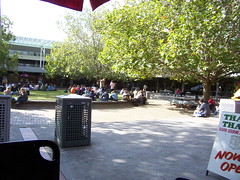
The Agora
Originally uploaded by Chaplinesque.
Where I will be today, though it doesn't look like this on a winter day.
The Prayers of the People
Intercessions 24th July, 2005
We come to pray as the church. We pray for Rowan of Canterbury, Peter our Archbishop, Philip our own bishop, and for all the clergy and people of God in this and every place. We pray for each and every one of us, as members of the baptised community, who are being trained for the kingdom of heaven, that we may be eager to do your will and walk in your ways; bringing out of our treasures both that which is old and that which is new, to the greater joy of your people and to the glory of your name.
Lord, in your mercy,
Hear our prayers.
We pray for the world. For those in positions of governance and authority: that there may be peace among the peoples and nations, among all powers and principalities, so that every people might learn to seek the great value of God’s shalom, that peace that passes understanding, and that each of us might work, as we can, for a world that has both justice and charity for all.
Lord, in your mercy,
Hear our prayer
We pray for the victims. For those who touched by wars and acts of violence, by fear, famine and natural disaster; for the people of Iraq, Israel and Palestine, the horn of Africa, Southeast Asia, and for the residents and commuters of London. That violence and terror, corruption and injustice might cease, and peaceful understanding grow; that we might see how much we have in common, how much we have to lose, and how much to gain in sharing peace and plenty.
Lord in your mercy,
Hear our prayer.
We pray for this community, for the city of Melbourne and for the ministries of this city church in serving those who are far off and those who are near. We pray for those who live and work nearby, for patients in hospitals, students in schools and Universities of good learning, for those who make daily use of our breakfast program and the Lazarus Centre. We remember those who are informed and nourished by the evening seminars of the Institute for Spiritual Studies, those who sit and watch in the Icon School and those who take wisdom and solace in the ministry of our book-room. We also pray for those who gather in our building weekly and those who come to pray in our chapels and in our daily services, that in all we are and all we do as a people and a parish we will glorify your name.
Lord, in your mercy,
Hear our prayer.
We pray for our own congregation and for all who are all in need: for those seeking a deeper understanding of God, those who suffering any grief or trouble, and those who are ministering to them. We pray for the poor, the sick the needy, and for all who have asked for our prayers
[read from list] ….
Lord, in your mercy,
Hear our prayer.
We pray for those who have died recently, [read from list] We pray for those who will die today, and we remember all who will rise with Christ, remembering in particular those whose anniversaries occur at this time.
[read from list]
Rest eternal grant to them O lord,
And let light perpetual shine upon them.
Friday, July 22, 2005
Name This Photo!
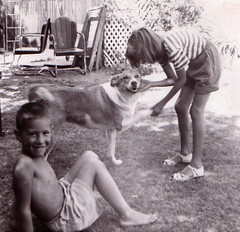
Name This Photo!
Originally uploaded by Chaplinesque.
Taken in Sacramento in the Fifties when I was less than 10.
Grandparent Church?
When I first came to Australia, four and a half years ago, I was surprised by how easily young people, traditional secondary and tertiary students, related to older people. They were much quicker to engage in conversation, ask good questions, share their experience and be willing to listen to others, even older folk. I think there can be a real segregation by age in the US, and it didn’t seem as rigorous here. But the experience on Sunday made me wonder.
Perhaps it is just that Christianity is no longer seen as a vital and valid spiritual path or wisdom tradition. There has certainly been enough detritus thrown around by the church over the years to give any seeker reason to pause. But there are also some deep roots, soft wisdom, sanity and sanctity, as well as communities of seekers gathered to share and enrich the journey; so that it would be sad, and a bit severe to write the whole amalgam away because of some of the seedier and noisier disciples of the way.
I came across a line of Shakespeare years ago that fits the church well. “Lilies that fester smell far worse than weeds”, and I always think of the church: sometimes it is capable of great mercy, justice, prophesy; other times it is merely a well oiled cog in the wheel of dehumanisation. But the community I saw last week was healthy, good-hearted, open for conversation, looked to be sharing their lives, and that needs to be said and to be honoured in a world where so many are lonely and needful of company on the road.
In a world with so many travellers, people on the move, we need places for a new kind of family to take place; and many churches can offer that. I think the people I was with last Sunday would love to share the journey with folks of difference ages, difference style, to take the chance to grow together.
Ann Lamott writes somewhere about “Uncle Jesus,” and, although I am not sure what exactly she means, I like the sound of it; because that image moves some new and needed room into the possibility of God meeting flesh in daily life. Remembering those friendly elders, maybe we need to start talking about “Grandparent Church.”
